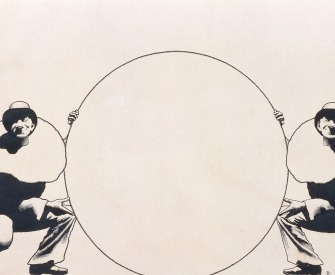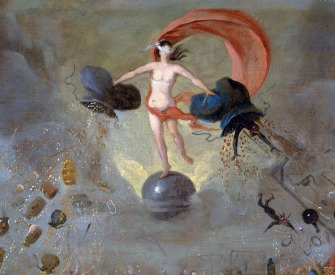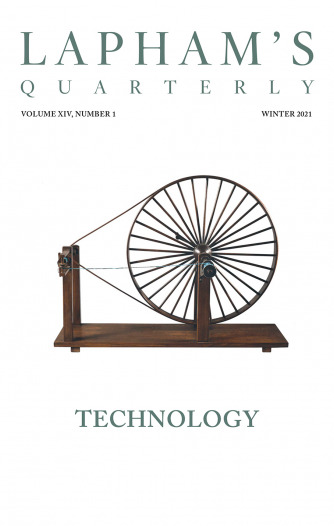We cannot say what the woman might be physically, if the girl were not allowed all the freedom of the boy in romping, climbing, swimming, playing whoop and ball.
—Elizabeth Cady Stanton, 1848
Neon signs shine in Las Vegas, Nevada in the early 1980s. Photographer Carol M. Highsmith, Library of Congress.
The office park sat in a patch of desert eight miles off the Strip. I pulled the address out of my pocket. I hadn’t imagined gamblers doing business alongside divorce lawyers and accountants. In my denim miniskirt and Converse sneakers, I felt more like a teenage runaway than an interviewee. I pulled my hair out of its ponytail so that it fell over my shoulders and hid my bra straps.
I was twenty-four and had moved to Las Vegas to be with a guy I had been dating for a few months. We broke up soon after I arrived. I didn’t know a single person in town. But no one else seemed to either. It was 2001, and Vegas was the fastest-growing metropolitan area in America. Almost fifteen hundred people were moving into the city each week. Everyone I met was very much like me and had just ended up there.
After the breakup I rented a room in a motel just north of the Strip in a neighborhood known as Naked City. In the fifties it had been home to strippers who sunbathed in the nude to avoid tan lines. Now bail bondsmen, hookers, Vietnam vets, and irritable motel clerks added color to the place. My motel was within walking distance of the Little White Wedding Chapel and Johnny Tocco’s Boxing Gym and a short drive to the downtown casinos: Binion’s Horseshoe, the El Cortez, and the Aztec—home of the fifty-nine-cent strawberry shortcake. The cigarette burns in the motel’s bedspreads were big enough to fit a leg through, and the staccato of stilettos across the floor upstairs made it hard to get a good night’s sleep. But at seventeen dollars a night, it was affordable, and it allowed dogs. So Otis my sixty-pound chow chow and I moved in. The wooden nightstand showcased the room’s only decor: a Rand McNally Road Atlas and a Magic 8 Ball.
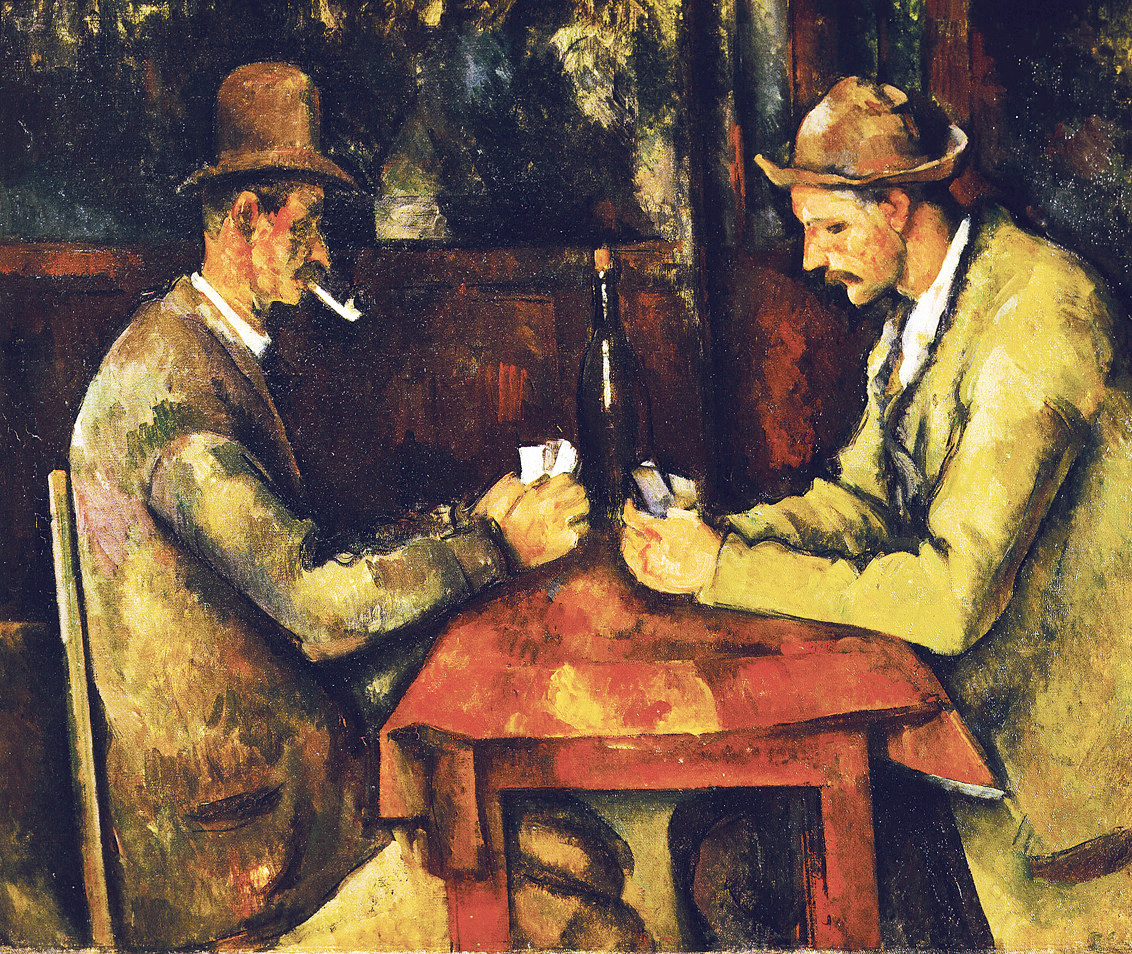
Card Players, by Paul Cézanne, c. 1893. Musée d'Orsay, Paris.
My odyssey through the sports-betting underworld, however, would considerably change my lifestyle. Though broke and having no idea how to place a bet, in four short years I would be working fifteen hour days as a figures girl at an offshore sportsbook in the Caribbean, living in a ranch house with a maid and a cook, taking meetings in an open-air strip club, and wiring money across international waters. But today, I just needed a job.
In a row of offices with signs like NEVADA INSURANCE and COLDWELL BANKER stood a suite with no sign and white plastic blinds covering its windows. Next to the door was a square address plaque and scrawled in its center, in Wite-Out correction pen, was DINK INC. From inside, a television blared. The sound of a bugle summoned horses to the starting gate at a racetrack. I knocked.
The door opened, revealing a guy about six foot four, 280 pounds. His hair was a heap of shiny, springy brown curls, the kind you see in ads for home perms. Tucked into his armpit was a Daily Racing Form, and in his hand was a puffy white bagel overstuffed with lox. He introduced himself as Dink, then took a bite of his sandwich. With mouth full he asked if my dog had an opinion on the Yankees game.
Dink was in his late forties, but his bashful smile and distracting habit of twisting his curls around his pointer finger made him appear much younger. He dressed like the adults with mental retardation I had met while volunteering at a group home. His Chicago Cubs T-shirt was two sizes too small for his expansive frame. Royal-blue elasticized cotton shorts were pulled high above his belly button. White tube socks were stretched to the middle of his pale, hairless shins.
Inside the suite, a long banquet table was cluttered: hockey digests, baseball encyclopedias, a baseball prospectus, sports pages from USA Today, the New York Post, the Las Vegas Review-Journal, dozens of calculators, telephones, mechanical pencils, computer monitors, and several copies of Fuzzy Creatures Quarterly, a magazine that offered tips on how to better love and care for one’s hamster, ferret, or guinea pig. At the front of the office, a tower of six forty-inch televisions balanced on a flimsy metal stand, each tuned to a different sport. Dink took his seat at the head of the table. In front of him, stacks of cash were piled as high as his bottle of Yoo-hoo. I stared at the money, mesmerized, and took a seat.
He nodded to one of the TVs, and in a heavy Queens accent he said, “We need Minnesoter and undah, for a decent amount.”
Having no idea what he was talking about, I said, “Okay.”
In the long silence that followed, Dink twirled and twirled his curls, engrossed in the basketball games and horse races. The action on TV reflected off his eyeglasses, which were as thick as hockey pucks and cloudy with thumbprints. Rising from the floor were stacks of books, all of which appeared to be on the subjects of hockey and New York punk bands, except for one on the very bottom: Hide Your A$$et$ and Disappear: A Step-by-Step Guide to Vanishing Without a Trace.
On the TV, a player for Minnesota made two free throws. Unsure of whether or not this was a good thing for Dink, I stayed quiet and massaged Otis’ back with the bottom of my sneaker. Dink clicked the eraser of his mechanical pencil, then scribbled something down in his raggedy five-subject notebook. Then he took a swig of his Yoo-hoo and asked me what I knew about gambling.
M y dad first took me to the track when I was seven, and there he taught me the basics of a racing form. Even though I knew how to tell the difference in seconds between the dog’s time and the average winning time on the track and knew enough to check up on how long it had been since the dog had last practiced or competed, these facts mattered little. My seven-year-old sensibility ruled. I was a girl; I liked girl dogs. I was skinny; I liked skinny dogs. In the time it took me to circle the names of the lightest girl dogs of all twelve races, we had arrived.
Before each race, in exchange for the twenty dollars in betting money he gave me, Dad had me run down to the paddock where the dogs could be viewed and report back whether any of them had taken a shit. This was part of his handicapping strategy. Dad believed that the dogs that went to the bathroom right before they ran were lighter and would therefore run faster. On the rare occasions that a dog would make too wide a turn and crash snout first into a concrete wall, or get electrocuted by faulty machinery, I brought the race form home with me. Alone in my room, I tore the dog’s name out of the form, tucked it under my Virgin Mary nightlight, and recited ten Hail Marys.
These were some of the things I knew about gambling. I told Dink about my first weeks in Las Vegas and how I became obsessed with Flip It, the game where spinners flip dollar tokens up onto a shelf and a metal bar pushes an already existing stack of coins toward the edge. The coins that fall over the edge you win. After work, I would drive to the Stratosphere, one of the handful of casinos that had Flip It, and circle each machine, peering into it at all angles. After determining which machine’s tokens would be the first to fall, I’d begin to play. One evening, the casino manager took me aside. I thought he was going to yell at me for knocking my hip against the machine, which I sometimes did to help push tokens over the edge. Instead, the manager told me that he’d seen me the last few evenings and advised me to stop playing. Flip It was a gimmick. It was for “retards.”
“You were addicted to Flip It?” Dink asked.
“I wasn’t addicted,” I answered, rolling my eyes.
“How am I supposed to trust you with my money? You’re gonna rob me to go play Flip It.”
“No, I’m not,” I said. I hadn’t realized he planned to entrust me with his money. I too began twirling my curls.
“Good. Hours are eight till five with a four-hour lunch break between ten and two, Monday through Saturday. Sundays we work eight to four straight. Pay is twenty dollars an hour, under the table, but you get bonuses, vacations, free meals.”
Despite the experience gleaned from my dad’s small-time gambling, I was not qualified to work for Dink Inc. Dink was a professional sports gambler. He bet on the NBA, NFL, PGA, college basketball and football, tennis, WNBA, the Little League World Series, Miss America pageants, the National Spelling Bee, and the Coney Island hot-dog eating contest. He specialized in horses, hockey, baseball, and also dabbled in poker. When he spoke of money lines, run lines, ten-cent lines, spreads, odds, and propositions, it all went over my head.
Suddenly, a guy a little older than me walked into the office without knocking. His Y-back tank top flaunted his self-tanned, salon-waxed, well-built upper body. He tossed a wad of money onto the table. It was rubber banded in the middle and folded in half.
Dink introduced him as Robbie J., one of “the crew.” He greeted me with a wink and patted Otis on his head. I smiled hello.
“You think I’m good lookin’?” he said.
“You’re okay,” I said.
“Oh, sweetie, I’m more than okay.” He flexed his biceps.
Dink’s cell phone rang. An office phone rang. The computers began to ding.
“New York’s moving, what do you want me to do?” Robbie J. asked.
“Call Jazz,” Dink said.
Robbie J. picked up two receivers and feverishly dialed two separate phones simultaneously. Dink grabbed for his phone and dialed a number.
“Responsibility to come on time to this job is number one,” Dink continued. His palm cupped the receiver pushed to his ear. “You have to have the mind for numbers and be able to pick up things that have to do with numbers, number two. And don’t steal, number three. Most people fail at one of those.” He uncupped his hand. “Nine-nine-two Dinky, lookin’ for a line on the New York Liberty, WNBA. Over for a dime, please.”
Still seated in his office chair, Dink wheeled toward the window. “There’s more crew members, two very important ones. But one’s in a cage and one’s on a yacht in Europe.” He unpeeled two glossy photographs from the wall and handed them to me. One photo was a close-up of a fat brown hamster with watery black eyes. The other was of a petite blonde in her fifties with lips painted coral. She cradled dozens of banded stacks of hundred-dollar bills and proudly presented these bundles to the photographer, as though they were a newborn baby. “That’s Jyrki, my hamster”—named after Jyrki Lumme, a former NHL defenseman. “And Tulip, my wife.”
Dink noticed that another race was about to start on one of the televisions. “I’m gonna bet the two here. First-time starter. Could be a total zero.
“One-six-four Ivy,” he said into the receiver. “Hollywood Park, race four. The two to win for a nickel.”
The horses shot out of the starting gate, and Dink bounced up and down in his chair as though he were the jockey. Robbie J. continued talking hurriedly on the phones. The two-horse won and Dink shouted, “I’m a genius! I’m a genius!” He hovered over his racing form like a schoolboy trying to keep other kids from cheating, jotted something down, and quickly turned the page. “So?” he said. “You want the job?”
O ver the next three days, Dink sat with me in the office and gave me gambling tutorials. By the evening of our last session, my five-subject notebook was nearly full—not with statistics and notes regarding important sports-betting information, but intricate doodles: balloons and flowers and jungles with monkeys half hidden by palm trees. I hadn’t understood a thing Dink taught me. To look busy, I drew.
“We shop for the best value,” Dink said. “If we don’t get the best of it, I’ll be broke and you’ll be out of a job. When I die, I want my tombstone to say, ‘Dinky. He died with the best of it.’”
It would be months on the job before I would understand the lessons Dink tried to teach me that day. The first lesson I learned was that while it may be illegal for an individual to be a bookmaker, it is not illegal to gamble for a living. The second lesson was that despite the tens of thousands of dollars in bets he made each day, the money Dink bet was always his own. He did not take other people’s bets and was therefore not a bookie. Professional gambler was the occupation he listed when he filed his taxes. The bets he lost he used as tax write-offs. The fact that he had an office and employees, though it gave him an aura of officialdom, simply reflected the complexity of his betting. He couldn’t do it alone.
As a sports gambler, Dink’s job wasn’t simply to figure out which team would win. As I learned, if all you had to do to win money betting baseball was predict the winner, you, me, and everyone else in the world would bet on the first-place team every time they played, and by the end of the regular season, we’d all be rich. But gamblers can’t make money by just betting on a team that wins more often than it loses. That’s because bookmakers create odds and lines that, in essence, penalize people who bet on the favorite. The line is an attempt by bookmakers to make both teams in any given matchup appear equally attractive. They want their books balanced; they want as many people to bet on the underdog as on the favorite.
The key to winning money is knowing a good line when you see one. Value, not just who you think is going to win or lose, is the overriding consideration.
To understand value, Dink first determined for himself what he thought the line should be. He researched as much as possible about teams and specific matchups, weighing the relevant factors in order to arrive at his best educated guess as to each game’s likely outcome. I had assumed that as a gambler Dink researched teams, weather, and statistics and made bets for himself based on that information, but it took me a while to understand what “shopping for the best value” entailed. Whether or not we thought a certain team was going to win didn’t matter. If the price was right, we bought it. When Dink said that we must always get the best of it, he meant that we must find a line that gave him an edge—a line that offered the most reward with the least risk. That, to me, didn’t seem like gambling. It seemed like we were bargain hunting for luck.
T he next morning at a quarter to eight, I arrived at Dink Inc. for my first shift, convinced I would make a fatal mistake with Dink’s money.
Across from me, Robbie J. worked on his rundown sheets—long pieces of paper with tiny blank boxes designed for listing the day’s matchups and the lines on each game. Autumn brought preseason NBA, hockey, NFL, college football, and baseball playoffs. Fearing that it would take me too long to complete these sheets and that I would miss something, I wrote mine out the night before. With the televisions turned off, the office was quiet. The only sound came from underneath the table where Otis lay, licking his paws.
Tony, the casino runner, ogled an amateur porn site, stroking his thick beard and shifting his posture, as we all waited for Dink to arrive with his bankroll. Tony’s job was to visit several different casinos and call Dink with the lines each sportsbook had posted. This is what was referred to as “shopping for numbers.” Runners were necessary for two reasons. One, our gambling software broadcasted the lines from just a handful of Las Vegas’ 150 licensed sportsbooks. If Tony hustled, he was sure to find a bargain at one of them elsewhere in Clark County for Dink to bet. The other reason was that betting limits were higher in person than they were over the phone. If Dink found a cheap price on a team, why bet five hundred dollars over the phone when he could wager five thousand in person? What good was getting the best of it if you couldn’t bet the most on it?
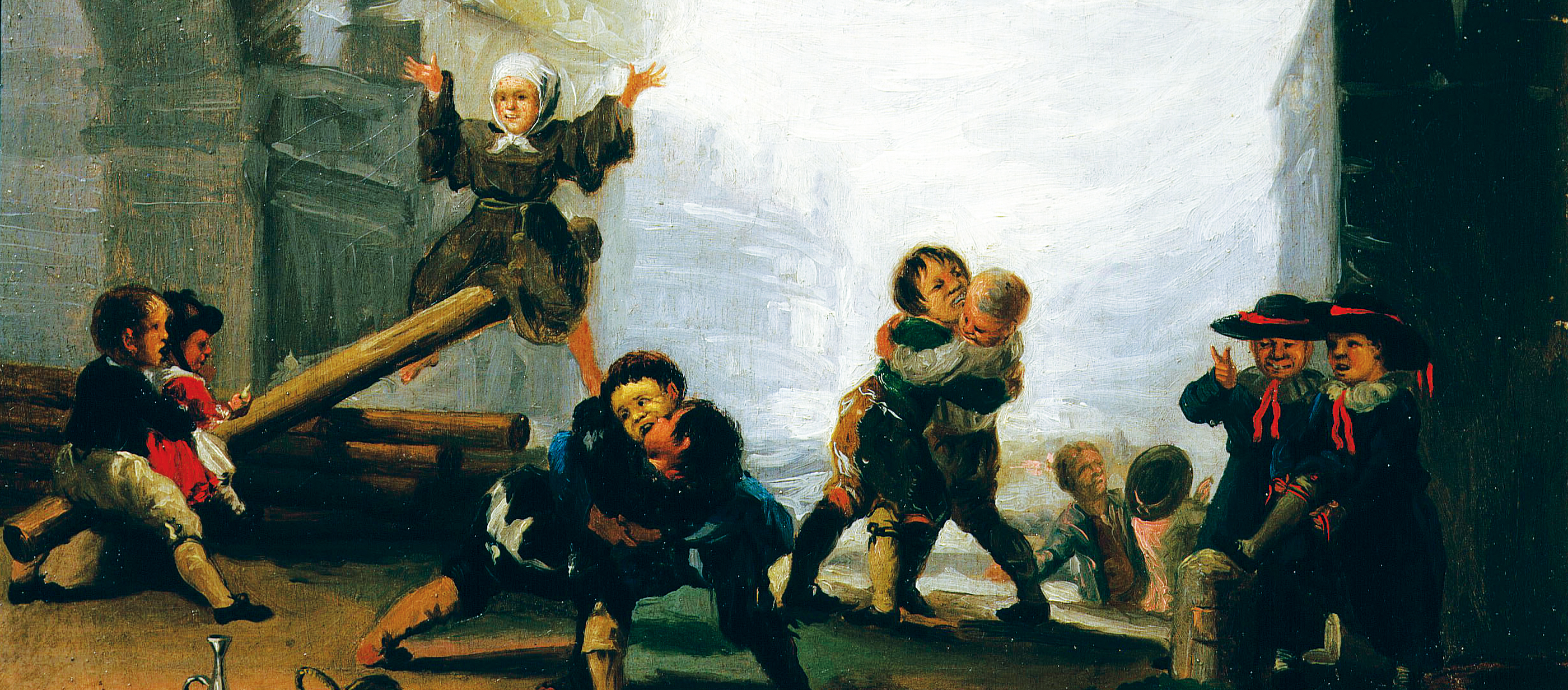
Boys Playing at Seesaw, attributed to Francisco José de Goya y Lucientes, c. 1785. National Museum, Gdańsk, Poland.
As bet-out clerks, Robbie J. and I also shopped for numbers, but instead of driving around Vegas we did our shopping by calling bookmakers or visiting their websites. This included the legal bookmakers, based offshore, and illegal bookmakers, based in big cities and small towns across America.
I took out a stack of index cards that I had made to memorize this new foreign language. The part of the business that caused me the most confusion was that the method of betting varied with each sport. You didn’t bet on baseball the same way you bet on basketball, and in hockey you could bet any number of ways. There was a Canadian line, a puck line, an East Coast line, and even a line called the Grand Salami.
I flipped an index card.
Grand Salami. The grand total of goals scored in all the hockey games of the day. It can be wagered to go over/under.
Robbie J. looked at me and raised his perfectly waxed eyebrows. Wrinkles bulged across his shaved head.
“Flash cards?” he said, giggling.
“I’m nervous,” I said.
“’Cause I’m so good lookin’?”
Even Money.
Flip.
A bet in which no vigorish is laid.
“No. Because I keep thinking I’m gonna bet thousands of dollars on the wrong team.”
Tony and Robbie J. offered different advice, but their sentiments were the same. Dink came up with the plan, we followed it.
“Dinky’s the architect, we’re the construction workers,” Robbie J. said. “Just copy what I do and try not to get too distracted by my beautiful muscles.”
Between my two phones I had sixty bookmakers programmed on speed dial. Beneath the speed-dial cover plate was a list of bookmakers’ offices, each with a different code name and password. I had spent plenty of hours becoming acquainted with the telephones. It was important to be quick on them and to know which bookmaker booked which sport, what time they opened, closed, and what their maximum limits were. One of the bookmakers on my list was Texas Toast, a farmer in south Texas who was also a poker player. A notoriously slow speaker, he took twenty minutes to give a rundown of his day’s odds. Dink always assigned him to his new clerks.
Robbie J. picked up his receiver and punched a speed-dial button with the eraser of his pencil. I picked up mine.
“Yep,” Texas Toast answered.
“Hi. Uh, Nine-seven-six Popcorn. Can I get a rundown?”
There was a long silence. In the background, I thought I heard a cow moo.
“My gawd, Popcorn, you sound like a child. Here we go … N … B … A. Golden State … four … and … a hook. Eighty … eight. Bucks … six … and … a hook. Ninety … two.”
I wondered what a hook was. Too shy to ask, I pretended to fill in the blank boxes of my rundown sheet and then called the next bookmaker on my list.
An eight-hundred number and a man with a Caribbean accent answered. “Sports. Dis is Bush.”
“G-J-nine-seven-two Dinky,” I said. “Can I get a rundown?”
“Of course, Ms. Dinky. Starting with college football. Jee-or-jee-uh, Boo-dog, ten and a half …”
Robbie J. held a receiver to each ear.
He spoke into one phone, “Gimme the Bulls first half, over oh-one minus the oh-nine for two dimes.”
Then the other: “I’ll take the Heat over the eighty-nine flat for a dime.”
In between confirming one bet and making another, he slid a three-ply ticket from the pile in front of him and jotted down the name of the office with whom he bet, the bet itself, and the amount he bet to win. With the motion of someone throwing a Frisbee, he tossed his tickets one by one to Dink. Over the table the tickets flew, their top and bottom pages fluttering like moth wings. Two thousand, five thousand, twelve thousand dollars’ worth of bets soared toward Dink. In one quick motion, Dink snatched the tickets out of midair as though they were pesky bugs.

Card Players, by Paul Cézanne, c. 1893. Musée d'Orsay, Paris.
I lost track of where I was on the rundown and hung up on Bush in midsentence.
“What’d he have on Morehead?” Dink asked me.
“Who?” I said.
“Morehead,” Dink repeated.
“I didn’t call Morehead,” I said.
“No, moron,” said Robbie J. “Morehead’s a football team.”
“Morehead’s a college,” Dink corrected.
“The office you just called, what did they have on Morehead?” Robbie J. asked.
I looked down at the tiny boxes on my sheet. They were all blank.
“Forget it, we missed it.” Dink yelled. “Call Fort Knox. We’re on the other side. Go! Go! Go!”
I didn’t have Fort Knox programmed to my speed dial so I picked up the phone and pretended to call a bookmaker just to make it appear as though I was doing something.
“Beth, you gotta say who you’re calling so no one else wastes their time calling the same office. Okay?” Dink said.
“Okay,” I said.
The computers beeped, along with the fax machine. One of the fourteen phones rang. I had no idea which one.
“So?” Robbie J. snapped, and I nearly jumped out of my seat. His hand gripped the receiver so hard his knuckles turned white. He was waiting on me to make a call. “Who are you on the phone with?”
“Uhm,” I said, and hung up.
I found the ringing phone. It was Tony, prepared with his rundown, calling from a men’s bathroom inside the Stardust casino. The Stardust was the preeminent Las Vegas sportsbook because it was the first to post the day’s lines. For professionals like Dinky, these lines calculated by handicappers but untested by the market were pure potential. Any mistake, any miscalculation or oversight—maybe the line didn’t take into account the college quarterback who stayed up till two in the morning downing tequila shots—was begging for a smart bettor to take advantage of it.
Hunting is all that’s worth living for—all time is lost what is not spent in hunting—it is like the air we breathe—if we have it not we die—it’s the sport of kings, the image of war without its guilt.
—Robert Smith Surtees, 1843Gamblers called these virginal lines the early lines, and there wasn’t a wiseguy in the country who didn’t want to get down on them. To protect itself from getting hammered by the smart bettors, however, the Stardust managers limited the number of bets they took before they had a chance to adjust their lines. It was a first come, first served setup to bet the early lines. I had heard from Dink and the other gamblers that one time competition became so fierce that for a while some gambling bosses paid homeless people to sleep in the Stardust sportsbook. The homeless player wasn’t making a bet, he was just staking claim to a position in line until 7:50, when the regular runner moved in, slipped the bum twenty bucks, and took his place in the line. Eventually, in preparation for the next day’s odds, the homeless players began camping out on the sportsbook’s purple-and-green-flowered carpet at 7:00 at night. The managers put an end to the situation by incorporating a lottery. Get here at 7:45, guys, they told the runners, and draw a number from the hat.
In Nevada’s 184 legalized sportsbooks, an estimated $2.6 billion is wagered every year. But this take is nothing compared to the under-the-table operations that occur every day in the least suspicious circumstances: casual bets among friends, the Super Bowl office pool, or complex wagers on college playoffs are estimated to move between $80 and $300 billion a year. Almost as soon as the Internet was invented, people began to gamble there too, betting $651 million online in 1998, a figure which sextupled over the next seven years to almost $4 billion. By the time I began working in the business in 2001, the days of hiring homeless people to secure an edge or searching for bookmakers in the backs of bars were long gone. By toughening gambling laws and money-laundering sentences, the U.S. government pushed bookmakers offshore. The first time Dink opened a Daily Racing Form and saw advertisements for gambling parlors based in Antigua and the Dominican Republic, he couldn’t believe it. Bookmakers? Advertising? At worst it was a police scam, he thought, and at best it was a swindle. Dink spoke to a lawyer. “Internet gambling is untested waters,” the lawyer explained. “But for now, it’s legal.” Five years later, Congress would pass the Unlawful Internet Gambling Enforcement Act which would have a widespread effect on many Internet gambling sites, forcing players to rely on foreign credit cards and middlemen, ensuring online gaming was not just for dabblers.
I n the afternoon we bet on the later games. Field goals, foul shots, flip shots, and snaps pushed the afternoon into nighttime. Trying to remember who and what we needed on each event was exhausting. In the first half we rooted for a team to score a lot of points, and in the second half we rooted for them not to score. We rooted for a team to make a field goal, and twenty minutes later we rooted for them to fumble. It was important for one team to win by three or five, but definitely not four.
“See these tickets,” Dink said. There were enough of them now to fill a shoebox. “This is what I’ve been talking about. These bets could be sold for something. Hopefully the gambling gods will be on my side, but I can go to sleep tonight knowing I have the best of it.”
My brain was mush. I didn’t have the energy to even feign interest. Dink noticed the sullen look on my face and assumed my spirits were low because I had yet to make a bet. To boost my morale, he allowed me the honor of making the day’s last wager.
“Okay, here. You’re gonna do this right now,” he said. “Call Top of the World and ask for game 224, Milwaukee money line for one dime.”
“Come on baby, you can do it,” Robbie J. said.
I lifted my cheek off the table and reached sluggishly for the phone.
“Sports.”
“Hi, Six-four-six Double D.”
“Go’head Double D.”
“Game 224, Milwaukee money line?”
“Game 224, I got Bucks minus the fifty-five, total at one-twenty-one.”
“Okay,” I said. I slid a three-ply ticket from my own little pile. “I’ll take the fifty-five …”
“No, no, no, not take,” Dink said.
Oh God. Enough already. My instinct was to hang up.
“Stay on the phone,” Dink instructed in a hushed tone. “Milwaukee’s favored. You don’t take the favorite. You lay the favorite. You take the dog.”
“You there, Double D?”
“Yeah, hi. Actually, can I lay the fifty-five to win a dime?”
On the screen in front of me, the basketball game changed from minus 155 to minus 159. I realized Dinky’s opinion was so respected that when he or his crew bet money on a game, the office we bet with changed their odds. I thought that was cool as hell.
“You got it. Bucks money line risking fifteen-fifty to win a dime. Name and password for confirmation.”
“Six-four-six Double D.”
Robbie J. blew me a kiss. My heart swelled with pride. In girly cursive, I wrote the bet neatly onto a ticket and tossed it to Dink. For the remainder of the evening, the three of us unwound. We pushed the boxes of leftover pizza to the side and stretched our legs over the banquet table. Otis slept at my feet, surrounded by empty two-liter bottles of Coca-Cola. It was like a Norman Rockwell portrait of a family, but instead of bowed heads and palms in prayer, we rooted for the Bucks to hit a three.
